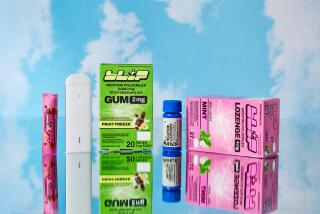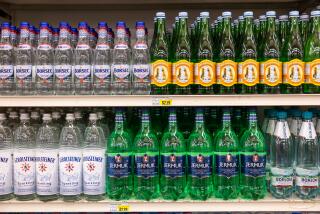Next Wave of Beverages
- Share via
The nation’s largest beverage makers are about to launch an all-out campaign to change your definition of water.
In coming months, PepsiCo Inc., Snapple Beverage Group Inc. and other companies will roll out a barrage of lightly sweetened “waters” laced with fruit flavors, vitamins, herbs and even ingredients used to treat specific medical conditions.
With soda sales slipping and energy drinks losing their buzz among consumers, beverage makers are hoping these enhanced waters can build on the success of bottled water, providing consumers something new that won’t make them feel guilty.
“We’re just giving [consumers] more reasons to drink water,” said Chad Dick, senior marketing manager for PepsiCo’s Aquafina brand, which is launching a line of fruit-flavored, vitamin-enhanced waters called Aquafina Essentials.
With prices up to 30% higher than that of most bottled waters or sodas, enhanced waters also are giving a healthy boost to beverage makers’ bottom lines.
Most enhanced waters, with 10 to 40 calories per 8-ounce serving, are still lower in calories than juice or soda, but some have as many as 80 calories per serving, bringing the total calorie count to 160 for the average 16-ounce container. By contrast, non-diet colas have about 215 calories per 16-ounce serving and orange juice has about 225 calories.
The higher-calorie waters are “starting to be more like a juice drink,” said Valerie Skala, a vice president of analytic product management with food research firm Information Resources Inc.
Bottled water has done so well because people are buying into the purity, said Gary Hemphill, vice president of Beverage Marketing Corp., a New York research firm.
“When you start adding some things in, the purity equation gets muddled,” he said.
With caffeinated and oxygenated waters having drifted off into retail oblivion, Hemphill is not sure whether consumers will latch on to enhanced waters.
But many believe the more mainstream enhanced waters have a good shot at getting Americans to drink more water, offering healthy additives such as vitamins, herbs, electrolytes, calcium and soluble fiber.
Based on preliminary sales figures, Skala of Information Resources projects sales of nearly $200 million by year’s end--still small compared with last year’s $14.7 billion in carbonated beverage sales, but a big start for a new category.
“I think flavored [still] water is going to become a section almost unto itself,” she said.
The first such products out on supermarket shelves in the last year were Energy Brand’s VitaminWater, Veryfine’s Fruit20 and Propel by PepsiCo’s Gatorade brand that is a so-called fitness water with vitamins B and C in flavors such as black cherry and orange.
In coming months, much of the rest of the beverage industry will be jumping in, including Snapple with its Elements fruit-flavored waters and health products maker Baxter International Inc. with Pulse, a fruity water supplement designed to ward off prostate trouble in men and ease menopause in women.
But the entry of soda giants Coca-Cola Co. and PepsiCo will move these waters into the mainstream, analysts said.
PepsiCo launches Aquafina Essentials next month. Coca-Cola will introduce Dasani NutriWater early next year.
Like many other enhanced waters, these drinks have fruit flavors designed to mask the chalky taste of the vitamin solutions and other ingredients.
However, they’re still clear like water, a factor that Dick of PepsiCo said was important for Aquafina in convincing people the drink was healthy and pure as water despite its sweet taste.
“When you are a clear product, that more closely links you with water’s heritage,” Dick said.
Bottled water has been a boost to soda giants such as PepsiCo in the last several years.
Though sales of carbonated beverages such as soda have dropped about 4% in the last five years, sales of bottled water have more than tripled, as people have become more health-conscious and leery of the quality of tap water.
Aquafina rang up $214 million in sales last year, and Dasani brought in $168 million, according to Information Resources.
And although energy drinks such as Red Bull had seemed poised to capture a greater share of the beverage market, sales growth has slowed over the last year, Skala said.
“I really think those products are fad products that are definitely on a downward trend,” Skala said.
Water, analysts said, is here to stay.
And as more people live lives on the go, they’ll need to carry bottles of it with them.
Flavored waters are just a way to keep people from getting bored with water, said Marie Devlin, brand manager of Gatorade’s Propel.
“The idea is just to have another alternative that [consumers] still see as healthy.”
Propel is focused on fitness-conscious customers, while Snapple appears to be targeting its Elements at the energy drink set with vibrant colors and exotic ingredients such as ginseng, guarana, bee pollen and gingko biloba as well as more traditional health enhancers such as beta carotene.
Trading down to plain water for these consumers would be too difficult, said Michael Sands, Snapple’s chief marketing and operations officer.
“Consumers want nirvana; they want something to be sweet and have no calories, yet be natural like water,” Sands said.
Snapple tried to bottle that equation with a product flavored with fruit essence, called Snap20, that it test-marketed in Santa Barbara last year.
But consumers said it wasn’t sweet enough. So its new version, Elements, contains fructose, vivid colors and 100 calories.
That, to Hemphill, raises the question, “When is water no longer water?”
And will these products keep consumers from drinking plain old water?
“This just draws more attention and traffic to the bottled water aisle,” said International Bottled Water Assn. spokesman Stephen Kay. “That’s a good thing.”
More to Read
Inside the business of entertainment
The Wide Shot brings you news, analysis and insights on everything from streaming wars to production — and what it all means for the future.
You may occasionally receive promotional content from the Los Angeles Times.










